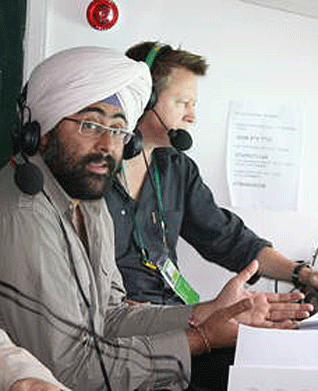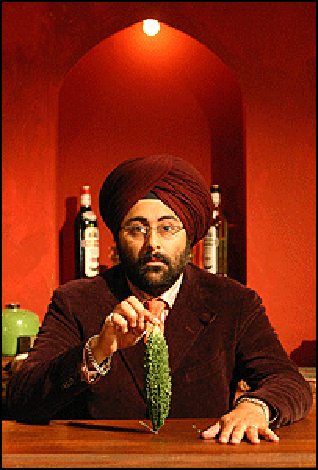Columnists
Playing Devil's Advocate
by HARDEEP SINGH KOHLI
I had a heated debate at dinner the other evening with a very bright and well-informed woman.
Let me set the scene. She was a white, middle-class author and critic; I was a slightly overweight weegie Sikh with an unhealthy love of corduroy.
The crux of the discussion was about the death of belief and faith, and the consequent lack of moral and religious under-pinning of Christmas; a light-hearted topic for chit chat, I trust you'll agree.
The argument widened into the notion of Britain not being a Christian country anymore and all the problems contingent on that. One side argued that the Christian heart of Britain should be reinstated. The other side argued that Britain had long since ceased to be Christian; that the influx of other religions had created a pluralistic, multi-faith country; that, if anything, Britain was moving towards Humanism.
Bizarrely, I found myself arguing for the first position and my friend arguing the second. Perhaps not what you'd expect, but, to me, it's quite straightforward.
These nations of ours, loosely collected under the banner of a kingdom, are nations founded on Christian beliefs. As a Sikh, I have absolutely no problem with that at all. In fact, I celebrate it and argue for its strengthening.
Now, this may strike certain of you as a curious position to hold, but it makes absolute sense. Christianity and Christian thinking are woven into the very fabric of this country. To deny that would leave a moral and religious vacuum, a vacuum that would remain unfilled or, worse still, filled by some less desirable belief system.
I'm not for a moment suggesting that we turn our country back into an outpost of the Holy Roman Empire or have it run strictly by the diktats of Calvinism, but I do think we need to embrace the historical fact that this country has a Christian heritage.
It could be me, but we do at times seem to have lost our moral compass, a compass that was at one time guided by faith and belief. I was taught by the Jesuits in Glasgow, and an excellent education it was, too. Not just an academic upbringing, but one that educated me in notions of social justice, of equality, of morality. These beliefs built upon those instilled in me by my Sikh upbringing, beliefs of a very similar nature.
I'm not for a moment suggesting that we all become hyper-religious. I just think we should occasionally look back at the antecedents of our society, rather than continually look forward to an altogether unsure future.
In some way, this embracing of our Christian heritage would help assuage the fears we have with regard to Islam. A recent survey among Scots showed a marked suspicion, a lack of empathy, towards Scottish Muslims. Underpinning this, perhaps, is a misplaced sense that Scots and British Muslims are attempting (en masse) to exert their religious identity on the rest of us.
Now clearly, this is not the case; but perhaps one cannot be too critical of those Muslims who are exerting their faith. There is no Christian ballast to push against. What is Christian about our cities and towns full of drunk, violent youth? What is Christian about the celebration of mediocrity that celebrity culture has invoked?
And what, my friends, is Christian about endless shopping, wrapping, eating and the watching of James Bond films?
What is Christian about Christmas?
Hardeep Singh is a British comedian, journalist and broadcaster. He also sits on the jury for the world-renowned Booker Prize for Fiction.
[Courtesy: Scotland on Sunday]
Conversation about this article
1: Harinder (Mohali, Punjab), December 23, 2007, 9:44 AM.
Some extremist elements in Islam have the capacity to instill terror anywhere, including within its own followers. Our historical experience with them is not one with pleasent memories. 1947 was the latest encounter, when we lost all our ancestral lands to their bigotry. The concerns of the British are understandable, considering this history.
2: Ravinder Singh (Memphis, Tennessee, U.S.A.), December 23, 2007, 10:43 AM.
My question is: prior to Britain being a Christian country, what was it? Less than a millennium ago, there were different religions and beliefs, and they are now. In America, it too is believed by some that this country is a Christian country. But my question is: what did the First Nations believe in, before the arrival of the Europeans only a few centuries ago? I don't think we can say that a country belongs, even historically, to any particular religion. The same goes for countries with Mulsim, Budddhist and Hindu majority populations.
3: I.J.Singh (New York, U.S.A.), December 23, 2007, 5:30 PM.
Let me, too, be the devil's advocate for a bit. The issue is not quite as simple or straight forward as it appears to be. It is undeniably true that the founders of modern American society were observing Christians. But Jefferson, Adams, Madison, and the like (the Founding Fathers) very clearly drew a wall of separation between private belief and governmental policy. It was Jefferson who said, "How does it matter to me if my neighbor believes there are twenty Gods or that there is none"? I have to concede that this critical distinction between Church and State has never been so thoroughly muddled as by the current crop of politicians who run the country and its institutions. Even the smallest minority, be it Muslims, Jews, Sikhs, even agnostics or atheists, deserve the same rights as the majority, and deserve to be equally protected under the law. In a religious state, a believer of a different religion, or a non-believer would have some rights abrogated. This would be true, for instance in Israel and Pakistan, which are states based on religion. (I know there are other religious states like Iran and Malaysia as well with similarly truncated rights for people who believe differently.) The logical extension of such reasoning would be to advocate an independent country for each and every minority religion or culture. This would result in an increasingly fragmented world with greater tensions and hostilities between neighbors. So, to my mind, religiously-based states are not the ideal solution to mankind's problems. I also know that what is ideally undesirable can become necessary for survival and even historically inevitable. That's how I look at Pakistan, Israel, and other states with similar models of governance. This is also how I see the continuing struggle for Kurdistan and Khalistan, for example. As a minority, I cannot but be sensitive to even the smallest right of the smallest minority, be it the lone atheist or agnostic. I believe this is precisely what Sikh teaching tells me to do.
4: Kanwal Nain Singh (Lindsay, Ontario, Canada), December 23, 2007, 7:59 PM.
Is Christianity being threatened by Scottish Muslims? Who is threatening whom? Or, am I missing the point? Why are we continuing this debate of one religion being a threat to another? As the western countries get more cosmopolitan in the new century, the debate should be: are the newcomers, Asian, African, or mid-eastern, any threat economically, and culturally? Why drag religion in? The new immigrants do settle peacefully; they obtain their citizenship: abide by the rules of the new society; choose the better of the new values while conserving the good of the old ones. What is the need for religious posturing in a mixed society? I guess, if there is more emphasis on humanism, the religious divide will weaken itself until it is of no significance.
5: Mohan Singh (Leeds, U.K.), December 27, 2007, 12:51 PM.
Hardeep, you would be a great role model if you were saabat soorat ...




